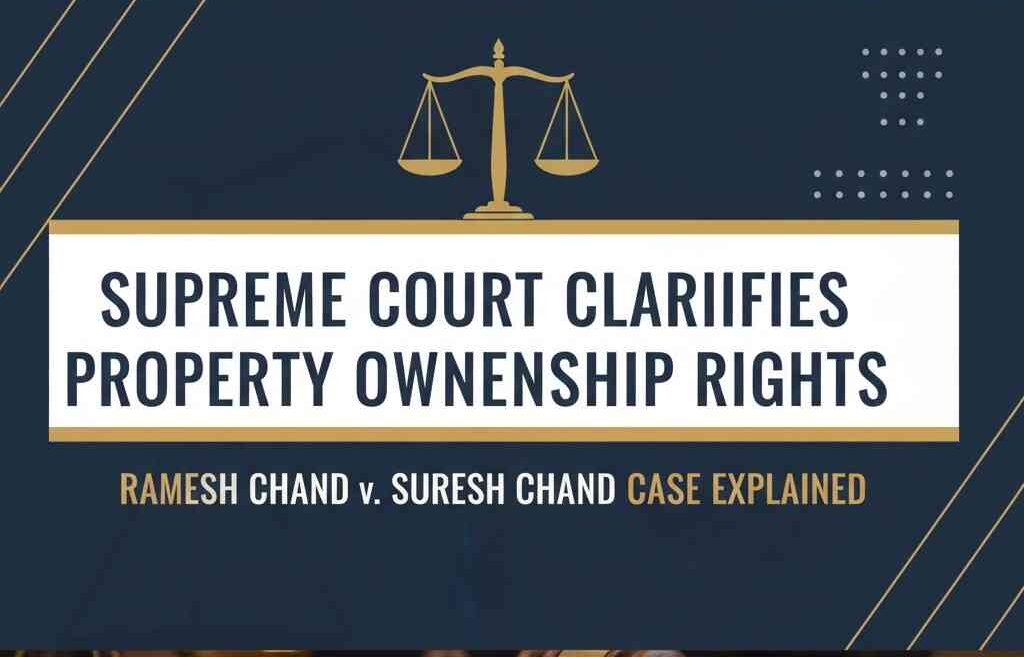Explore the Supreme Court’s ruling in Ramesh Chand v. Suresh Chand, emphasizing that documents like agreements to sell, general power of attorney, and wills do not confer ownership rights in immovable property. Understand the legal implications.
Supreme Court Ruling: Ownership Rights in Property – Ramesh Chand v. Suresh Chand
In a landmark decision on September 1, 2025, the Supreme Court of India addressed a pivotal issue concerning property ownership. The Court ruled that documents such as an agreement to sell, a general power of attorney (GPA), and a will do not, by themselves, confer ownership rights in immovable property. This clarification was made in the case of Ramesh Chand (D) through LRs v. Suresh Chand & Anr.
Case Background
The dispute centered around a property in Ambedkar Basti, Delhi, originally owned by Kundan Lal. Upon his death in 1997, his sons, Suresh Chand and Ramesh Chand, contested ownership. Suresh Chand claimed ownership based on documents executed by their father in May 1996, including an agreement to sell, a GPA, an affidavit, a receipt, and a registered will. Conversely, Ramesh Chand asserted that their father had orally transferred the property to him in 1973, and he had been in continuous possession since then.
Supreme Court’s Analysis
The Supreme Court meticulously examined the legal validity of the documents presented by Suresh Chand:
- Agreement to Sell: The Court reiterated that an agreement to sell is merely a contract to transfer property in the future and does not confer ownership rights. Under Section 54 of the Transfer of Property Act, 1882, a sale of immovable property is completed only through a registered sale deed.
- General Power of Attorney (GPA): The Court emphasized that a GPA is an instrument that authorizes an agent to act on behalf of the principal but does not transfer ownership rights in property. Even an irrevocable GPA does not convey title to the property.
- Will: The Court highlighted that a will must be proved in accordance with the law. In this case, the registered will executed by Kundan Lal in favor of Suresh Chand was surrounded by suspicious circumstances and lacked the necessary legal proof to establish its validity.
The Court concluded that none of these documents, individually or collectively, conferred valid ownership rights to Suresh Chand. Consequently, the Supreme Court set aside the Delhi High Court’s decision and restored the trial court’s order, which favored Ramesh Chand.
Legal Implications
This judgment reinforces the legal principle that:
- Registered Sale Deed: Only a registered sale deed can transfer ownership rights in immovable property.
- Role of GPA and Agreement to Sell: Documents like a GPA and an agreement to sell do not confer ownership rights; they may only create rights to seek specific performance of a contract.
- Validity of Wills: A will must be proved in accordance with the law, and any suspicious circumstances surrounding its execution can render it invalid.
This ruling serves as a critical reminder for individuals and legal professionals to ensure that property transactions are conducted through legally recognized and registered instruments to avoid disputes and ensure a clear title.
Frequently Asked Questions (FAQs)
What is the significance of a registered sale deed in property transactions?
A registered sale deed is the only legally recognized document that transfers ownership rights in immovable property. It provides clear evidence of the transaction and protects the interests of the buyer and seller.
What is the significance of a registered sale deed in property transactions?
A registered sale deed is the only legally recognized document that transfers ownership rights in immovable property. It provides clear evidence of the transaction and protects the interests of the buyer and seller.
Can a general power of attorney (GPA) be used to transfer property ownership?
No, a GPA does not transfer ownership rights. It only authorizes an agent to act on behalf of the principal. To transfer ownership, a registered sale deed is required.
How can one ensure the validity of a will?
To ensure a will’s validity, it must be executed in accordance with legal requirements, including being attested by witnesses and, if necessary, registered. Any suspicious circumstances surrounding its execution can lead to its invalidation.

























